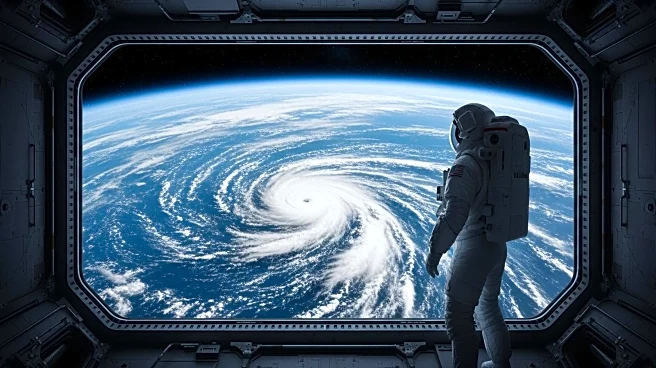What's Happening?
Japanese astronaut Kimiya Yui, aboard the International Space Station (ISS), has been observing two typhoons from orbit. Despite the ongoing U.S. government shutdown, Yui's social media updates have provided insights into the weather phenomena. Typhoon 22, although its eye has become somewhat unclear, continues to maintain strong intensity, while Typhoon 23 is characterized by thick rain clouds on its southern side. Yui, a flight engineer for Expedition 73, is also involved in preparations for the arrival of Japan's next-generation cargo vehicle, the HTV-X, which will be berthed at the ISS. The crew aboard the ISS includes members from Roscosmos and NASA, alongside Yui from JAXA. The station currently hosts seven astronauts and has been continuously crewed for nearly 25 years.
Why It's Important?
The observations made by astronaut Kimiya Yui highlight the critical role of the International Space Station in monitoring global weather patterns, particularly in regions prone to severe storms like typhoons. These updates are crucial for understanding the dynamics of such storms and can aid in disaster preparedness and response efforts. The ongoing U.S. government shutdown has limited updates from the ISS, underscoring the importance of international collaboration in space exploration and research. The preparations for the HTV-X cargo vehicle also demonstrate advancements in space logistics and the growing capabilities of international space agencies.
What's Next?
The arrival of Japan's HTV-X cargo vehicle at the ISS is a significant upcoming event, with preparations underway to ensure a successful berthing. This mission will test the capabilities of the ISS's robotic arm, operated by Yui, and will further international cooperation in space missions. The continued monitoring of typhoons from space will provide valuable data for meteorologists and climate scientists, potentially influencing future research and policy decisions related to climate change and disaster management.
Beyond the Headlines
The ability to observe and report on typhoons from space offers a unique perspective that can enhance our understanding of these powerful storms. It also highlights the importance of maintaining international partnerships in space exploration, especially during times of political and economic uncertainty. The ISS serves as a platform for scientific research that transcends national boundaries, fostering collaboration and innovation in addressing global challenges.











